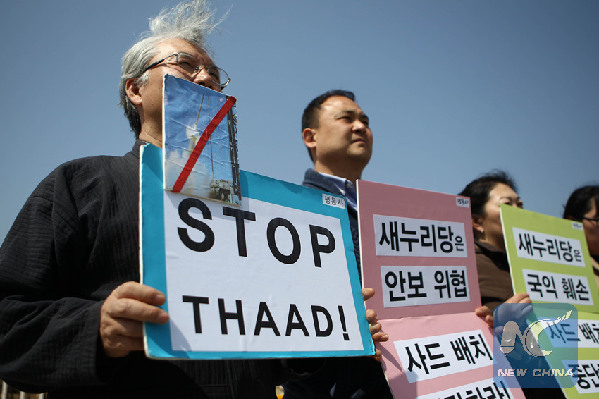THAAD deployment jeopardizes China and ROK
- By Kim Sangsoon
 0 Comment(s)
0 Comment(s) Print
Print E-mail China.org.cn, July 14, 2016
E-mail China.org.cn, July 14, 2016
|
|
|
South Korean protesters hold placards in front of the National Assembly in Seoul, South Korea, April 1, 2015, during a rally against the deployment of the advanced U.S. missile defense system THAAD on the Korean Peninsula. [Xinhua/Seongbin Kang] |
The decision to deploy a U.S. THAAD anti-missile defense unit in South Korea by the end of 2017 has triggered wide global concern. The reason behind it, according to the U.S. and South Korea, is to protect their citizens and defend the military forces of the South Korea-U.S. alliance against the threat of North Korean nuclear missiles.
The plan has met strong opposition from China and Russia.
"The deployment of the THAAD system goes far beyond the defense needs of the Korean Peninsula, and any justification for this holds no water," said Wang Yi, China's foreign minister. "We have every reason and right to question the real scheme behind these actions."
Russia's Foreign Ministry has also issued a warning, saying that the move will destabilize the region and calling for the parties in question to avoid moves that will cause irreversible damage.
In my opinion, even though South Korea is neither targeting China nor choosing to side with the U.S. and Japan, the action will end up jeopardizing both China and itself.
From the Chinese perspective, the U.S. deployment in South Korea, which is ostensibly targeting North Korea, will have a significant impact on Chinese and Russian strategic interests. At the same time, it has met domestic opposition and will also place South Korea in a passive position.
As far as I'm concerned, three reasons can be attributed to South Korea's plan for the deployment.
First, the South has felt increasing pressure from the North after its attempts to develop ballistic missiles, especially after the success of a Musudan intermediate-range missile, which cause the South to worry that the North's massive nuclear expansion is getting out of control.
Second, despite China's involvement in the UNSCR 2270 that poses tough sanctions toward the North, South Korea still doubts whether China has seriously taken its security into account and wielded enough sway on the North side.
Third, in the face of mounting pressure at home, President Park Geun-hye hopes to win back the support of the conservative side and get out of the political gridlock by deploying the THAAD system.
Though many Chinese think the anti-missile defense unit will do little to deter the North's threat and even doubt whether the North Koreans will actually attack their Southern compatriots by nuclear weapons, quite a few South Koreans still think it's possible for the North to resort to nuclear arms in a potential war scenario.
While far from perfect for a counterattack, the THAAD system, from the South Koreans' perspective, can act as deterrence to the North Korean threat following its multiple nuclear tests and missile launches.
If the THAAD system is to get installed, China-ROK relations may suffer, while the U.S., Japan and even North Korea may benefit from the deployment by taking advantage of the situation.
China and South Korea should, therefore, continue effective communication, especially among the senior level. The two sides need to respond calmly and work together to break away from this passive mode.
Kim Sangsoon is a researcher at the Charhar Institute.
The article was translated by Guo Yiming. Its unabridged version was published in Chinese.
Opinion articles reflect the views of their authors, not necessarily those of China.org.cn.




Go to Forum >>0 Comment(s)